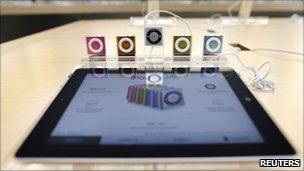Apple boss Steve Jobs shows off iCloud service
- Published
Amazon and Google are among firms that have launched cloud photo and music services before Apple
Apple has unveiled its much-anticipated iCloud service at its annual developers' conference.
Apple boss Steve Jobs returned from medical leave to show off the features of the web-based service.
He said iCloud was necessary because the PC was no longer the digital hub of users' digital lives.
The web-based service aims to synchronise and co-ordinate the key content people store and share across their devices.
Music match
Contacts, calendar and mail applications have been rewritten so a change to one propagates across the other versions on separate devices. This rewriting means Apple's MobileMe service will soon cease to exist.
Anyone buying an app, book or music track for one device will see it replicated on the other Apple devices they own. Similarly, bookmarks for interesting web pages will be shared across all gadgets.
Mr Jobs stressed that iCloud was "not just a hard disk in the sky".
"We are demoting the PC and Mac to just be a device," he said. "And moving the digital hub centre of your digital life to the cloud."

Updates for Apple's iOS and Mac operating system were also on show at WWDC
This would end the current frustration of keeping content such as photos and songs synchronised.
One key element of iCloud was Apple's music store iTunes, he said. This now has a iCloud element so music bought on one device can be propagated across all the Apple gadgets that person owns.
One part of the cloud-version of iTunes, called iTunes Match, will also scan the songs that people have ripped from their own CDs. This will recreate the library in the cloud without the need for the music to be uploaded. The service will cost $24.99 a year in the US. UK prices have yet to be given.
The release of iTunes Cloud pits Apple against Google and Amazon which have both unveiled their own web-based music storage services. However, both those lack the involvement of record labels and the ability to replicate an existing library.
"This is the first set of cards on the table for the long game which is increasingly moving access to all your media up into the cloud, " said Mike McGuire, senior analyst with research firm Gartner.
Apple CEO Steve Jobs unveils the iCloud service at the company's annual developers' conference in San Francisco
"We are seeing people putting pieces in place for the time when more and more consumers have those assets, not just in their immediate vicinity, but up in the cloud," he said. "Those kinds of transitions for consumers take a long time. They don't happen overnight."
Cheaper code
Apple also talked about updates for the iOS operating system that runs on iPhones, iPads and iPod Touches. It said it had sold more than 200 million iOS devices.
One novel feature integrates micro-blogging service Twitter into camera and photo apps to make it easier for people to share snaps with followers. iOS5 also introduces an auto-focus feature that lets a user zoom in on a particular part of what they are taking a picture of.
Apple said it also planned to introduce a system that would update iOS devices without the need to plug them in to a PC or Mac. The new version of iOS will be available in the Autumn.
Lion, the forthcoming update for the Apple Mac operating system was also demonstrated at the WWDC. Apple marketing boss Phil Schiller said the software had more than 250 new features.
One key update, he said, was the inclusion of multi-touch trackpads so Apple's notebooks can handle gestures such as pinch-to-zoom and momentum based scrolling seen before now on the iPhone.
Another gesture will take users to Mission Control, a global overview of everything happening on a notebook. Lion also has an autosave feature that automatically keeps copies of documents and other files.
Also introduced was a peer-to-peer wi-fi feature called Air Drop that lets Mac owners share files with friends and colleagues by dragging and dropping an icon onto a picture.
Apple said Lion will no longer be available on a physical CD, instead the software will have to be downloaded. Apple also cut the price of the update from more than $100 to $29 (£20.99 in the UK) when it goes on sale in July.
- Published31 May 2011
- Published10 May 2011
- Published29 March 2011